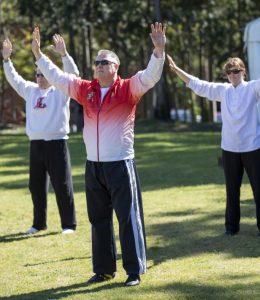Nature-Based and Mind-Body Practices Produce Cost-Effective Improvements in Life Satisfaction and Happiness
By John M. de Castro, Ph.D.
“our emotional connections with nature are predictive of our attitudes and the choices we make about living sustainable lifestyles. But in addition, the study also found a unique connection between nature and happiness itself.” – Marilyn Price-Mitchell
Modern living is stressful, perhaps, in part because it has divorced us from the natural world that our species was immersed in throughout its evolutionary history. Modern environments may be damaging to our health and well-being simply because the species did not evolve to cope with them. This suggests that returning to nature, at least occasionally, may be beneficial. Indeed, researchers are beginning to study nature walks or what the Japanese call “Forest Bathing” and their effects on our mental and physical health.
A variety of forms of mindfulness training including mind-body practices have been shown to increase psychological well-being and happiness. People have long reported that walking in nature elevates their mood and Tai Chi practice has also been found to increase happiness. The evidence has been accumulating. So, it makes sense to step back and summarize what has been learned
In today’s Research News article “Nature-Based Interventions and Mind-Body Interventions: Saving Public Health Costs Whilst Increasing Life Satisfaction and Happiness.” (See summary below or view the full text of the study at: https://www.ncbi.nlm.nih.gov/pmc/articles/PMC7660642/ ) Pretty and Barton analyze four databases (Green Light Trust (n = 32), Trust Links Growing Together (n = 328), Ecominds green care interventions (n = 154), and a tai chi programme (n = 128) on the effects of nature-based and mind-body interventions on satisfaction with life and happiness. These interventions included woodland therapy, therapeutic horticulture, ecotherapy/green care, and tai chi.They then compared the costs of these programs to the costs of public health and other services to produce comparable changes in life satisfaction and happiness. They also looked at the cost savings produced by nature-based and mind-body interventions in preventing the use of other medical and psychological services.
They report that the analysis demonstrated that all nature-based and Tai Chi interventions produced large and significant improvements in satisfaction with life and happiness and these improvements were still present 2 years later. They report that the magnitude of these changes is substantially greater than those produced by major life events such as marriage, birth of a child, etc. They find that the economic impact of these programs is substantial and estimated savings of between £6000–£14,000 per person per year.
These findings are remarkable and suggest that nature-based and Tai Chi interventions are highly effective in improving life satisfaction and happiness. These improvements are not only psychological but also economic saving money by reducing the need for medical and other services. These programs then produce great value for the money. It is recommended that such programs should be incorporated into standard public health services.
So, nature-based and mind-body practices produce cost-effective improvements in life satisfaction and happiness.
“If you want to further your happiness and success, then having a mind-body-spirit connection is vital. “– Health and Happiness
CMCS – Center for Mindfulness and Contemplative Studies
This and other Contemplative Studies posts are also available on Google+ https://plus.google.com/106784388191201299496/posts and on Twitter @MindfulResearch
Study Summary
Pretty, J., & Barton, J. (2020). Nature-Based Interventions and Mind-Body Interventions: Saving Public Health Costs Whilst Increasing Life Satisfaction and Happiness. International journal of environmental research and public health, 17(21), 7769. https://doi.org/10.3390/ijerph17217769
Abstract
A number of countries have begun to adopt prevention pays policies and practices to reduce pressure on health and social care systems. Most affluent countries have seen substantial increases in the incidence and costs of non-communicable diseases. The interest in social models for health has led to the growth in use of social prescribing and psychological therapies. At the same time, there has been growth in application of a variety of nature-based and mind–body interventions (NBIs and MBIs) aimed at improving health and longevity. We assess four NBI/MBI programmes (woodland therapy, therapeutic horticulture, ecotherapy/green care, and tai chi) on life satisfaction/happiness and costs of use of public services. These interventions produce rises in life satisfaction/happiness of 1.00 pts to 7.29 (n = 644; p < 0.001) (for courses or participation >50 h). These increases are greater than many positive life events (e.g., marriage or a new child); few countries or cities see +1 pt increases over a decade. The net present economic benefits per person from reduced public service use are £830–£31,520 (after 1 year) and £6450–£11,980 (after 10 years). We conclude that NBIs and MBIs can play a role in helping to reduce the costs on health systems, while increasing the well-being of participants.
https://www.ncbi.nlm.nih.gov/pmc/articles/PMC7660642/
